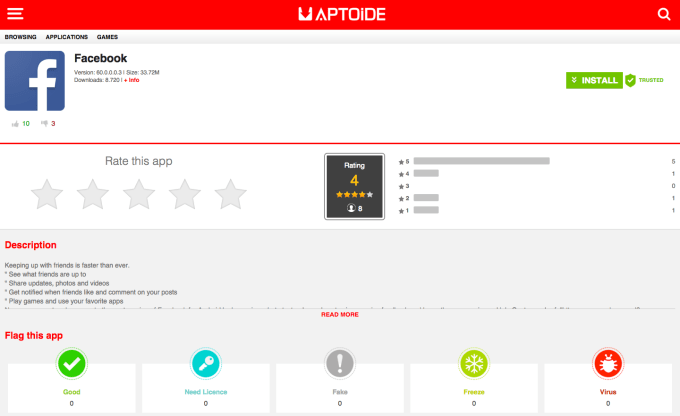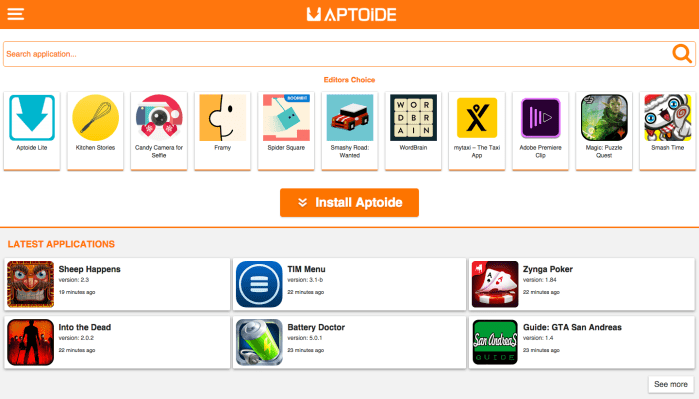Searching the app store is a pain in the ass unless you know what you’re looking for. That’s even more true if you happen to own a $150 smartphone and have patchy a mobile internet connection on a prepay deal, as many of the world’s new internet population from emerging markets do.
That’s why Aptoide, a third-party app store with a focus on emerging markets, has raised $4 million to offer an alternative for Android, which is undoubtedly the world’s mobile operating system with nearly 70 global marketshare, according to Statcounter.
Aptoide, which was started in Portugal in 2011, currently offers an app store for Android and Android TVs. Still headquartered in Lisbon, Portugal, it has offices in Singapore — from where it focuses on Southeast Asia — and Shenzhen, China, where it works with handset manufacturing partners to help growth its presence in emerging markets. (Chinese OEMs are increasingly focused on India, Southeast Asia, Latin America and other parts of the world with fast-growth potential.)
Aptoide raised a $1 million seed round in 2013, and this $4 million Series A is led by e.ventures, with additional participation from China’s Gobi Ventures, Southeast Asia-based Golden Gate Ventures, and existing investor Portugal Ventures. The plan is to use the money to push on in Southeast Asia and Latin America, grow the userbase and app count, and land more strategic partners.
Alvaro Pinto, COO and co-founder at Aptoide, told TechCrunch that 100 million people downloaded at least one app from the company’s app store in 2015, while — on average — active users download six to eight apps per month. Pinto added that the company has grown 100 percent year-on-year for the past three years, while it grew 200 percent in Southeast Asia last year alone and is seeing spikes in Latin America, too.
“It’s important for the market to have some alternative to what Google is doing,” he explained.
Right now, Aptoide counts 500,000 apps, including popular favorites like Facebook, Instagram, WhatsApp Clash of Clans, VLC and a some exclusives, such as apps enabling YouTube video downloads (something that Google prohibits in its store). Each app uses the the startups own SDK, which enables Aptoide to make money from in-app purchases and other payments, although advertising remains its biggest income driver.

“This market [for third-party app stores] is huge and we think there is space for everybody,” Pinto added in reference to the many stores that have emerged out of China, where Google Play is kneecapped by local censorship of Google services.
Chinese stores have not expanded overseas, however, and that is where Pinto and Aptoide see a growing opportunity. That’s why it set up a base in Shenzhen, China’s hardware hub which is home to smartphone makers, and it has deliberately ensured that its content is legal worldwide to enable these Android makers to bundle and integrate its services. So far, Pinto said, the company has agreements with 60 carriers and OEMs, which include Nokia (when it did Android), Jolla, and others.
Aptoide has also released a ‘lite’ version of its app store specifically for users with unreliable internet connections and budget devices with limited storage options. That was less than a month ago, so the company is not revealing too much data on that for now.
Pinto said that Aptoide is aiming to double its userbase and user numbers each year and, partnerships aside, it has an interesting social feature that helps get word out to new users. Anyone can curate their own list of apps within the service — which, when shared on social media or other ways, helps raise visibility and draw in new users.
In that respect, Pinto likens the service to YouTube — which is not an obvious initial comparison.
“YouTube users have their own channels and can create playlists, and we are similar. Users can make a selection of apps for photography, for example, and then share that. That feature is being used not only by end users, but also developers sharing their work or companies that are sharing with their customers,” he explained.
